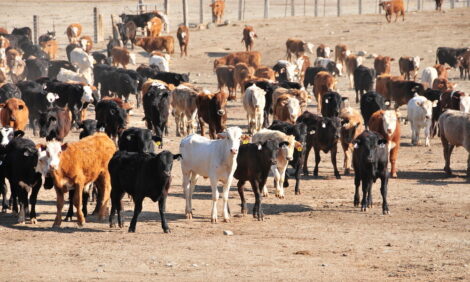



Purdue receives $1.4 million for cattle, swine research projects
Three grants were awarded in totalThe US Department of Agriculture’s National Institute of Food and Agriculture has awarded three grants totalling more than $1.4 million for research on health issues in cattle and swine, according to a press release from Purdue University. The projects are among $13 million in investments that NIFA recently announced for its Animal Nutrition, Growth and Lactation Program.
Jon Schoonmaker, associate professor of animal sciences, and six colleagues received a four-year, $650,000 grant to learn more about the dietary nontherapeutic antibiotics on intestinal microbial populations, the metabolites the microbes produce, and how the latter impact the intestinal health of cattle.
Jonathan Pasternak and John Radcliffe in the Department of Animal Sciences received a three-year, $510,000 grant to understand the nonpathogenic factors that influence thyroid hormones in pigs.
Rafael Neves, assistant professor in the Department of Veterinary Clinical Sciences, and three colleagues received a two-year, $300,000 grant to identify the relationship of skeletal muscle metabolism with ketosis, a well-known metabolic disorder that afflicts dairy cows soon after giving birth.
In recent years, Schoonmaker has researched antibiotic alternatives and their effect on beef production and efficiency. Despite the increasing desire for alternatives to antibiotics, scientists know little about how they interact with bacteria and pathogens to alter intestinal function and integrity.
“This new USDA-funded project will allow me to dig more deeply into what makes current antibiotics so effective,” he said. “It’s important because the use of nontherapeutic antibiotics in livestock nutrition contributes to antibiotic resistance. Livestock producers want to decrease this impact on human health but need effective replacements to continue efficient production.”
Schoonmaker’s team includes Theresa Casey, associate professor of animal sciences; Timothy Johnson, assistant professor of animal sciences; Rafael Neves of veterinary medicine; Christina Ferreira, metabolomics analyst, Bindley Bioscience Center; Jyothi Thimmapuram, bioinformatics core director; and Bethany Funnell, clinical associate professor of veterinary medicine.
Schoonmaker will oversee the project and coordinate activities at the research farm. Funnell and Neves will monitor antibiotics in the animals. Johnson will evaluate changes in the microbiome, the set of microbes found within the cattle. Ferreira will evaluate changes to the metabolites produced by the intestinal bacteria. Casey and Thimmapuram will determine the effect of nontherapeutic antibiotics on gene expression in the host animals and link those changes to changes in the microbiome and metabolome, the array of metabolites contained in a biological sample.
Pasternak is especially interested in understanding the cause-and-effect relationship between hormone levels and growth and development. Pasternak’s previous work demonstrated pigs’ remarkable susceptibility to thyroid hormone suppression after infection with the porcine reproductive and respiratory syndrome virus (PRRSV).
“The physiological stress following PRRSV infection causes ‘nonthyroidal illness syndrome,’ which has also been observed in humans experiencing severe cases of COVID-19,” Pasternak said.
In these follow up studies Pasternak will examine whether other nonpathogenic physiological stressors, such as weaning or transport, similarly affect the thyroid hormone system in pigs.
“This is important because thyroid hormones are the master regulator of metabolic function,” he said. “Our previous work identified a significant correlation between the degree of thyroid suppression and key production parameters, including growth rate. Of course, correlation and causation are not the same thing, so a significant portion of the project is directed at understanding this fundamental relationship.”
For this objective, Pasternak will use a model of thyroid hormone suppression developed with support from the AgSEED (Agricultural Science and Extension for Economic Development) program.
Understanding the factors that negatively impact thyroid activity in pigs will help the research team develop management practices or treatments to limit the impact of such disruptions on the production system.
Most of the project will be carried out by Pasternak’s lab group, including two new graduate students. Radcliffe will join the University of Kentucky College of Agriculture, Food and Environment, as chair of the Department of Animal and Food Sciences on July 1. He will assist with weaning and shipping stress models, along with experiments to better understand the impact of thyroid suppression on digestive function and gut health.
Neves focuses much of his research on the origin of metabolic disorders that arise in dairy cows during the period three weeks before and after giving birth. Cows in early lactation undergo a state of negative nutrient balance. Lipokines – lipid-controlling hormones – are key in facilitating metabolic adaptations. The abnormal breakdown of fats can induce systemic inflammation and overwhelm the capacity of the cow’s liver to process fatty acids, leading to ketosis.
“Ketosis is a major metabolic disorder of dairy cows and causes $110 million to $330 million in annual losses to the dairy industry,” Neves said.
And yet, little research has examined the role of skeletal muscle in whole-body energy balance in dairy cows that have recently given birth.
Neves’s team includes Shihuan Kang, professor of animal sciences and the Cancer Center Chair in Stem Cell Biology; Amber Jannasch, assistant director of the Metabolite Profiling Facility; Ferreira of the Bindley Bioscience Center; and Thimmapuran of the Bioinformatics Core.
Kuang assisted Neves’s lab in isolating bovine embryonic cells that develop into muscle to prove the new study’s feasibility. Now they will perform real-time metabolic analysis with special equipment in Kuang’s lab. Jannasch and Ferreira will help Neves’ group identify the highly diverse types of lipids on a large scale. And Thimmapuran will facilitate the project’s transcriptome work – cataloging all of the RNA molecules in a cell.



